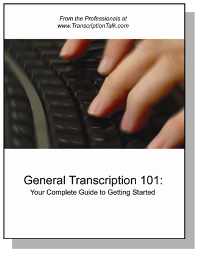Anyone who’s currently working as a transcriptionist knows that all you need to succeed in this industry is the ability to type at a decent speed...right?
Unfortunately, that’s a common misconception that a lot of people who have not worked in the industry have. The truth is that there’s a lot more than that involved. Essentially, in order to have a successful career as a transcriptionist, you need to be able to listen, think and type at the same time.
Listening and typing at the same time can be difficult enough with good audio. If you consider that a lot of times the audio we receive from clients can be muffled, garbled or contain foreign speakers, the level of difficulty increases.
In addition to just being able to listen and type at the same time, you have to be able to think about what you’re hearing/typing. A lot of times, a word or phrase will sound like x, y, z initially. However, by thinking about what you’re typing, you may realize that what you think you heard does not fit the context at all. Mindlessly typing does not enable you to do this, and while proofing, all three of us have come across more than our fair share of examples of a transcriptionist who obviously did not think about what they were transcribing. A good transcriptionist will use the context as a means to decipher words that are unfamiliar or maybe they can't quite make out. Good research skills are a must, as well, and we'll be addressing search techniques at a later time.
Additionally, one of the most important skills we need is to be able to actually take the spoken word and transcribe it in a way that fits written language grammar rules so that it actually makes sense to the person reading it. The way most people speak often does not fit these rules. Of course we all love when we get an exceptionally well-spoken person who has most likely prepared their speech ahead of time and follows most grammar rules, but the majority of files are not like this and critical thinking skills are an important part of what we need.
If you’re just starting to consider transcription as a career, this may seem overwhelming to you, and that is not my intention. However, it’s important to know that while you can make a decent living doing this work, it is not “easy money.” It takes a lot of hard work to develop the skills needed to succeed, and you must be committed to developing those skills or you will most likely give up before you reach the point where you are happy with your earnings.
I think that this blurb from Transcription 2000’s website sums it up very well:
What is transcription? Transcription is the manual act of typing the spoken word, whether live or recorded, from any audio format, to paper or computer file for someone to read at a later time.
Sounds simple! Anyone can do that, but not anyone can do it well.
Transcription, for the purposes of creating a reliable document for the end user, is a professional skill. This skill takes several years of regular practice to hone the ability to type exactly what is heard verbatim. "Listening" is the skill that must be acquired.
Do you remember the story of one person telling another something and it then gets passed on to ten people? As the story goes, what the tenth person states is nowhere near what was originally stated. This is true of experienced transcriptionists. They have mastered the skill of listening and typing exactly what is spoken.
Typing is the least important skill required in transcription. Typing is the LEAST important skill required as a transcriptionist. LEAST IMPORTANT SKILL.










































1 Comment:
Excellent post. And oh, so very true.
"Well, I can type - how hard can it be!"
Arrgghmmmfffttt.
Post a Comment